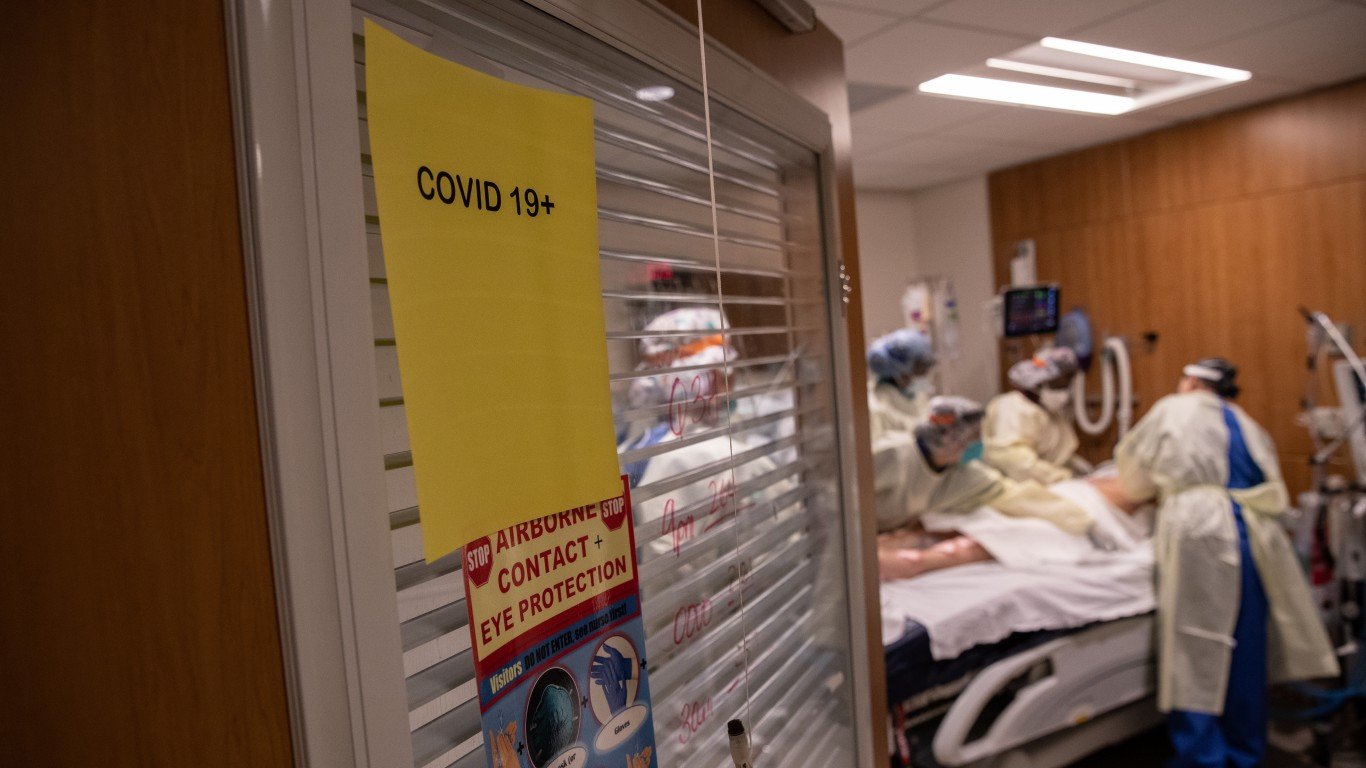

The U.S. has reported more than 30.5 million confirmed COVID-19 cases as of Apr. 8. More than 552,000 Americans have died of COVID-19 — the highest death toll of any country.
Nationwide, there were an average of 18.6 daily new coronavirus cases per 100,000 Americans in the week ending Apr. 8. Cumulatively, the U.S. has reported 9,304.5 cases per 100,000 Americans, and 168.5 deaths per 100,000 Americans.
In Pennsylvania, there were an average of 31.0 daily new coronavirus cases per 100,000 residents in the week ending Apr. 8. Cumulatively, Pennsylvania has reported 8,199.2 cases per 100,000 state residents, the 12th fewest of all 50 states. Pennsylvania has reported 197.1 deaths per 100,000, the 11th most of all 50 states.
While the nation’s largest metropolitan areas were hit hardest in the early months of the pandemic, nearly every city has suffered from the virus. Outbreaks are particularly likely to occur in places where large numbers of people tend to congregate, leaving cities with high concentrations of colleges, correctional facilities, and nursing homes particularly at risk.
Since the beginning of the pandemic, the Lebanon metropolitan area has reported 14,055 confirmed cases, or 10,058.8 per 100,000 residents — the most of any city in Pennsylvania.
Reading, the city with the second most cases per capita, has reported 9,818.1 cases per 100,000 residents.
The coronavirus crisis has led to widespread unemployment across the country as consumer-facing businesses are forced to close and customers are encouraged to stay home. Unemployment in Lebanon peaked at 14.1% in April 2020, and is now at 6.5% as of January 2021.
To determine the metropolitan area in each state with the highest number of COVID-19 cases per capita, 24/7 Wall St. compiled and reviewed data from state and local health departments. We ranked metropolitan areas according to the number of confirmed COVID-19 cases per 100,000 residents as of Apr. 8. Data was aggregated from the county level to the metropolitan area level using boundary definitions from the U.S. Census Bureau. Population data used to adjust case and death totals came from the U.S. Census Bureau’s 2019 American Community Survey and are five-year estimates.
| MSA | Population | Total cases | Cases per 100,000 | Total deaths | Deaths per 100,000 |
|---|---|---|---|---|---|
| Lebanon, PA | 139,729 | 14,055 | 10,058.8 | 265 | 189.7 |
| Reading, PA | 418,025 | 41,042 | 9,818.1 | 932 | 223.0 |
| Allentown-Bethlehem-Easton, PA-NJ | 837,610 | 80,614 | 9,624.3 | 1,879 | 224.3 |
| Johnstown, PA | 133,009 | 12,473 | 9,377.6 | 406 | 305.2 |
| Altoona, PA | 123,157 | 11,356 | 9,220.8 | 315 | 255.8 |
| State College, PA | 161,960 | 14,925 | 9,215.2 | 213 | 131.5 |
| Williamsport, PA | 114,330 | 10,478 | 9,164.7 | 265 | 231.8 |
| York-Hanover, PA | 445,565 | 40,322 | 9,049.6 | 752 | 168.8 |
| Lancaster, PA | 540,999 | 48,920 | 9,042.5 | 1,082 | 200.0 |
| Chambersburg-Waynesboro, PA | 154,147 | 13,744 | 8,916.2 | 343 | 222.5 |
| Philadelphia-Camden-Wilmington, PA-NJ-DE-MD | 6,079,130 | 511,752 | 8,418.2 | 11,824 | 194.5 |
| Bloomsburg-Berwick, PA | 83,974 | 6,879 | 8,191.8 | 189 | 225.1 |
| Scranton–Wilkes-Barre, PA | 555,642 | 45,273 | 8,147.9 | 1,253 | 225.5 |
| Gettysburg, PA | 102,470 | 8,302 | 8,101.9 | 161 | 157.1 |
| Harrisburg-Carlisle, PA | 571,013 | 44,342 | 7,765.5 | 1,115 | 195.3 |
| Pittsburgh, PA | 2,331,447 | 179,333 | 7,691.9 | 3,969 | 170.2 |
| East Stroudsburg, PA | 168,032 | 11,977 | 7,127.8 | 289 | 172.0 |
| Erie, PA | 273,835 | 18,926 | 6,911.5 | 396 | 144.6 |
Sponsored: Want to Retire Early? Here’s a Great First Step
Want retirement to come a few years earlier than you’d planned? Orare you ready to retire now, but want an extra set of eyes on your finances?
Now you can speak with up to 3 financial experts in your area for FREE. By simply clicking here you can begin to match with financial professionals who can help you build your plan to retire early. And the best part? The first conversation with them is free.
Click here to match with up to 3 financial pros who would be excited to help you make financial decisions.
Thank you for reading! Have some feedback for us?
Contact the 24/7 Wall St. editorial team.



